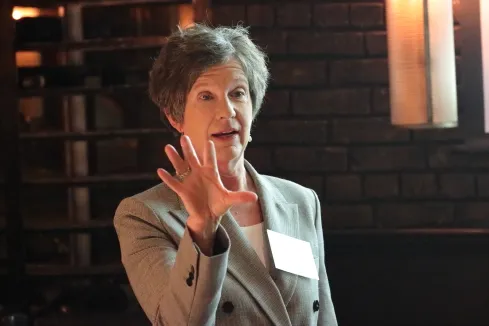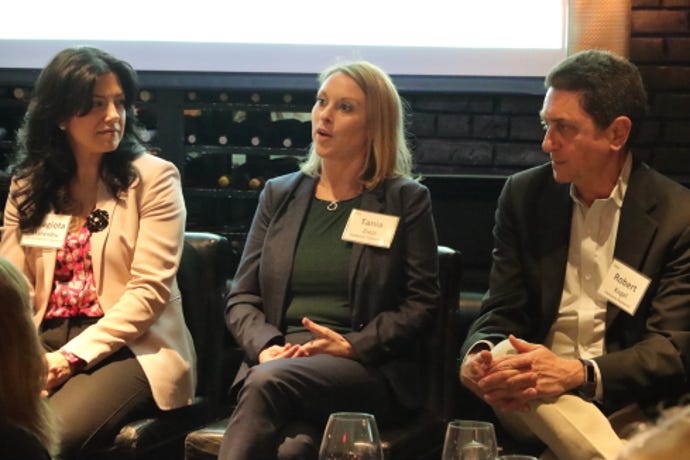Fulfilling the duties of a CFO is no longer just a matter of bookkeeping as organizations seek every possible advantage in the digital age.
A notion has emerged about the next-generation chief financial officer who leverages resources available through digital transformation for more than just efficiency. Some CFOs believe this change in duties was needed for their own benefit so they could better support CEOs and the boards of organizations.
This may also be part of an overall shakeup already under way in the C-suite, thanks to digital transformation. “A position that barely exists anymore, chief operating officer -- at one point there was something like 494 of the Fortune 500 had a chief operating officer,” said Jack McCullough, president of the CFO Leadership Council.
He spoke as part of a panel called CFO 3.0, discussing the future of finance and the role of CFO in the era of digital transformation. Some of the panelists admitted that technology remains a challenging hurdle to clear, with some manual systems still in place.
Sage, a provider of accounting and business management software, hosted the discussion last Wednesday in New York with Dave Kellogg, former CEO, host analytics, as moderator; McCullough; Marie Simard, CFO for Costa Farms; Panagiota Mahendru, CFO for the Center for Employment Opportunities; Tania Zieja, CFO for Halloran Consulting Group; and Robert Kugel, CFO research director for Ventana Research.
McCullough said COOs were typically groomed to become the next CEO when the current chief executive chose to step down, but leadership roles have changed substantially in light of technology's evolution. “That [COO] position has largely disappeared, and CFOs are taking on lot of those responsibilities,” he said. Now CFOs may be expected to possess acumen in operations as well as finance underpinned by deft use of technology. “That’s invaluable to CEOs,” McCullough said.
Based on the experiences of the panelists, antiquated practices dominated the practices of CFOs until recent times. McCullough said in his first job, he worked for a CFO who called personal computers a fad, relied on adding machines, and was adamantly opposed to change. “That guy was straight from Central Casting,” he said.
Old-school assumptions seem to be going extinct. Sage released a report during the panel comprised of input from more than 500 CFOs from different industries across country, discussing how their job descriptions may be defined in the future. The survey also asked what effect technology has on their daily duties. About 98% of survey respondents indicated that their jobs changed over the last five years.
The panelists described some of the technology-driven changes to their roles. For example, Mahendru said she is now able to work anywhere in the world thanks to digital, securely accessing information via the cloud through a VPN or comparable service. “Almost six, seven years back, you were not allowed to [remotely] access systems,” she said.
Zieja said in prior days payroll was phoned in, time sheets were marked in Excel, and expense checks were cut manually. “It was pretty painful,” she said. “On a short month, you only had a few days to pick your head up and look forward.” In the past, considerable time was spent reconciling and dealing with data, Zieja said. Now integrated systems can speed up those processes at the push of a button and help organizations go paperless.
Even reluctant CFOs who have not embraced technology or considered how it can be applied could be surprised to find themselves as the catalyst for change, Kugel said. Competition may drive them to adopt defensive implementations of technology, he said, as CFOs evolve out of necessity.
“Everybody effectively acknowledges the role is definitively changing,” said Nancy Harris, executive vice president for Sage North America. She gave an overview of the survey, where some 46% respondents indicated they faced increased demand to provide counsel to their businesses. About 76% of the surveyed CFOs indicated they played key roles in digital transformation.
Nancy Harris Image: Joao-Pierre S. Ruth
Sage’s report points to a growing understanding that CFOs need technology as much as other executive leaders. Some 92% of the respondents saw improved productivity as one of the chief benefits of automation. However, the transition is not without speed bumps. Many respondents to the survey believed large segments of their organizations are not ready for the tech update. There was also fear that AI and automation would replace people. “They also say they don’t think they have the skills within their organizations to head in this direction,” Harris said.
Despite such impediments, the report shows it may be impossible to hide from the changes digital transformation brings. Harris said the CFO role is now about getting smarter about what data and analytics can tell them so they can serve as advisors on strategy, sitting down alongside IT and business leaders. “There’s more pressure on to provide valuable insight into the business,” she said. “It’s well beyond the context of just ERP, accounting, and financials.”
For more on digital transformation in the enterprise, check out these articles.
10 Enterprise IT Transformation Trends to Watch for 2020
Towards Singularity: A False Separation of IT and Business
How to Create a Culture of Innovation
